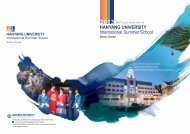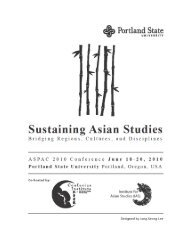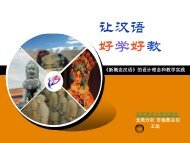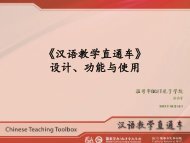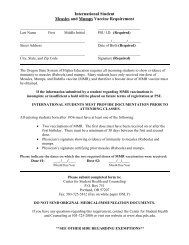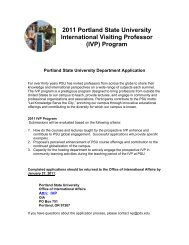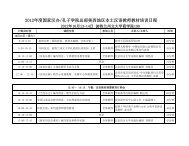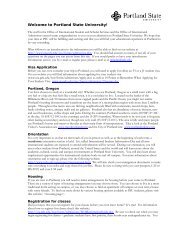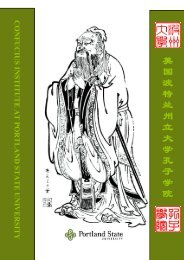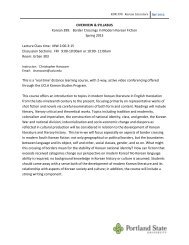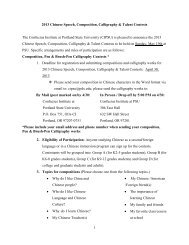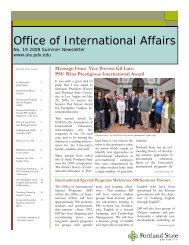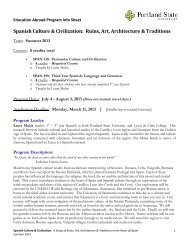ABSTRACTS - oia - Portland State University
ABSTRACTS - oia - Portland State University
ABSTRACTS - oia - Portland State University
Create successful ePaper yourself
Turn your PDF publications into a flip-book with our unique Google optimized e-Paper software.
ASPAC Conference 2010<br />
June 18 – 20, 2010 | <strong>Portland</strong>, OR<br />
received well form the government and general population as “aid without conditions,” while at the same<br />
time, Dushanbe has been gradually distancing itself from Moscow, as illustrated by the Tajik Language Law of<br />
October 2009.<br />
China’s increased presence in Central Asia will lead to stronger infrastructure, borders, and economic<br />
access, Tajikistan will again fulfill its role as a transit area and economic passage into the Middle East,<br />
reinforcing Central Asia’s historical role on the Silk Road. This strategy would facilitate the regional transition<br />
from fractured states under Russian dominance into stable, new markets for Chinese products.<br />
~ ~ ~ ~ ~ ~ ~ ~ ~ ~<br />
Jeffer Daykin<br />
The Reception of Eiichi Shibuawa’s Trade Mission to the United <strong>State</strong>s<br />
In 1909, the Japanese industrialist Eiichi Shibusawa brought a group of over fifty Japanese men and women<br />
to undertake a cross-country tour of the United <strong>State</strong>s at the invitation of the Associated Chambers of<br />
Commerce of the Pacific Coast. The mission was comprised of a wide range of leaders in business, finance,<br />
education, and journalism who were interested in establishing professional contacts and observing the<br />
functioning of various industries and enterprises. Though technically a private sector undertaking, the<br />
mission was conceived by Eiichi Shibusawa had an important diplomatic goal in that he hoped to improve<br />
relations between the two nations that had been marred by the eruption of anti-Japanese immigration along<br />
the Western United <strong>State</strong>s in 1907.<br />
This paper will present information about this little known example of non-governmental diplomacy<br />
and the context of transpacific relations in which it occurred. Far from being an isolated event, the 1909<br />
mission was one in a series of exchanges between United <strong>State</strong>s and Japanese businessmen that included a<br />
joint tour of China and was also tied to the international exposition held in Seattle that same year. A study of<br />
these events and the American reception of the mission in the cities and towns visited – including several<br />
stops in California, the epicenter of anti-Japanese agitation – helps illuminate the surprising good will that<br />
existed and reveals that perhaps another course of history between the United <strong>State</strong>s and Japan was possible.<br />
Mahesh Ranjan Debata<br />
International Response to Uyghur Separatism in Xinjiang<br />
~ ~ ~ ~ ~ ~ ~ ~ ~ ~<br />
China's Xinjiang region has been witness to separatism, religious extremism and international terrorism. There<br />
were a couple of major revolts in Xinjiang by the Uyghur separatists (one in August 2008 and the other in July<br />
2009). However, the Chinese government has been too strong for the minuscule Uyghur separatists. The PLA<br />
has so far been able to quell any sort of rebellion in its northwest, may it be Xinjiang or Tibet. The Uyghur<br />
separatists don't have the support of major powers. The USA does not support Uyghurs as it remains<br />
engaged in Afghanistan and Iraq. Now China and USA have common concern for international terrorism.<br />
The separatist cadres of East Turkistan Islamic Movement (ETIM) have been labeled as 'terrorists' both by<br />
the USA and the UN. The Uyghurs living in Turkey, Germany and other parts of Europe have failed in their<br />
efforts to internationalise the issue. After 9111, the Uyghur separatists are facing greater difficulty. Pakistan is<br />
cautioned by China to stay away from Uyghur separatists. The Central Asian Republics have been endorsing<br />
China's position in Xinjiang. India having its own problems of separatism and terrorism in the <strong>State</strong> of<br />
Jammu and Kashmir, has been cultivating a friendly relationship with China. There is no support from<br />
domestic neighbours like Tibet and Inner Mongolia. Against this background, this paper will discuss the<br />
problem of separatism and terrorism in Xinjiang and China's response in this regard. This paper will analyse<br />
the international response to separatism, religious extremism and terrorism in Xinjiang.<br />
~ ~ ~ ~ ~ ~ ~ ~ ~ ~<br />
9



